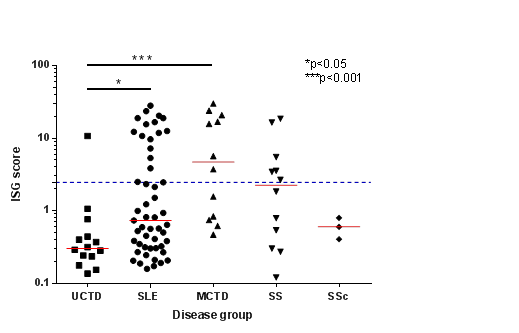Session Information
Date: Tuesday, November 15, 2016
Title: Systemic Lupus Erythematosus – Clinical Aspects and Treatment - Poster III: Biomarkers and Nephritis
Session Type: ACR Poster Session C
Session Time: 9:00AM-11:00AM
Background/Purpose: Type I interferon has been implicated in the pathogenesis of systemic lupus erythematosus (SLE), but much less is known about its role in other connective tissue diseases (CTDs). We aimed to determine the prevalence of a type I interferon signature across CTDs, and identify factors associated with elevated interferon activity.
Methods: Subjects were recruited from Central Manchester University Hospitals, UK between May 2014 and March 2016. Patients were categorised by their physician diagnosis into SLE, undifferentiated CTD (UCTD), mixed CTD (MCTD), Sjogren’s syndrome (SS) and systemic sclerosis (SSc). RT-qPCR was performed on cDNA derived from whole blood and the median fold change of six interferon-simulated genes (IFI27, IFI44L, IFIT1, ISG15, RSAD2, SIGLEC1) was compared with the median of healthy controls, to create an interferon sensitive gene (ISG) score for each patient. Scores higher than the mean of the controls plus two sd (>2.466) were designated as positive.
Results: We recruited 92 subjects with a median (IQR) age of 48.3 (33.5, 57.4) years. 86 (93.5%) were female, 70/92 (76%) were Caucasian and the median disease duration was 7.21 (3.06, 13.78) years. The most commonly present autoantibodies were anti-U1RNP (25/92 [27.2%]), anti-Ro/SSA (24/92 [26.1%]) and anti-dsDNA (22/92 [23.9%]). In total, 58/92 (63%) subjects had at least 1 positive autoantibody (Ro, La, Smith, RNP, chromatin, Scl-70, dsDNA or anti-CCP). Across all subjects, 31/92 (33.7%) had a positive ISG score. ISG scores were significantly higher in patients with SLE or MCTD, compared to UCTD (p=0.003 across all groups) (figure). All 3 SSc patients had a negative ISG score. In univariate logistic regression models, a positive ISG was significantly associated with the presence of anti-Smith, Ro, RNP and chromatin antibodies. Rheumatoid factor (but not anti-CCP) was also associated with a positive ISG score. These antibodies all remained significant after adjustment for age, gender, ethnicity (Caucasian or non-Caucasian) and clinical diagnosis (table). A significant association was observed between the number of autoantibodies (range 0-5) and a positive ISG score (OR 2.6 [1.73, 3.81], p<0.001). In a multivariable logistic regression model this observation remained significant after adjustment for age, gender, ethnicity and diagnosis (OR 2.2 [1.44, 3.50], p<0.001).
Conclusion: Expression of a type I interferon signature differs across CTD subtypes and is not observed in UCTD and SSc. The strongest factor associated with a positive ISG score was the type and number of autoantibodies, especially those binding to RNA antigens. 
|
Unadjusted model |
Adjusted model* * for age, gender, ethnicity and diagnosis |
|||
| OR | 95% CI | OR | 95% CI | |
| Anti-dsDNA | 2.50 | (0.934, 6.684) | 1.55 | (0.521, 4.623) |
| Anti-Smith | 12.2 | (3.111, 47.914) | 14.5 | (2.475, 85.491) |
| Anti-RNP | 8.04 | (2.883, 22.447) | 5.19 | (1.517, 17.749) |
| Anti-Ro | 9.37 | (3.250, 26.995) | 13.0 | (3.400, 49.542) |
| Anti-La | 2.30 | (0.771, 6.890) | 2.48 | (0.589, 10.421) |
| Anti-chromatin | 7.55 | (2.512, 22.683) | 5.69 | (1.512, 21.406) |
| Rheumatoid factor | 5.33 | (1.631, 17.442) | 11.5 | (2.100, 63.175) |
| Anti-scl70 | 1.55 | (0.320, 7.293) | 2.32 | (0.373, 14.512) |
| Anti-CCP | 1.33 | (0.211, 8.428) | 1.27 | (0.114, 14.091) |
To cite this abstract in AMA style:
Reynolds JA, Khan M, Briggs TA, Rice G, Crow Y, Parker B, Bruce IN. A Type-I Interferon Signature Is Associated with Autoantibody Profiles in Connective Tissue Diseases: Results from the Lupus Extended Autoimmune Phenotype (LEAP) Study [abstract]. Arthritis Rheumatol. 2016; 68 (suppl 10). https://acrabstracts.org/abstract/a-type-i-interferon-signature-is-associated-with-autoantibody-profiles-in-connective-tissue-diseases-results-from-the-lupus-extended-autoimmune-phenotype-leap-study/. Accessed .« Back to 2016 ACR/ARHP Annual Meeting
ACR Meeting Abstracts - https://acrabstracts.org/abstract/a-type-i-interferon-signature-is-associated-with-autoantibody-profiles-in-connective-tissue-diseases-results-from-the-lupus-extended-autoimmune-phenotype-leap-study/
